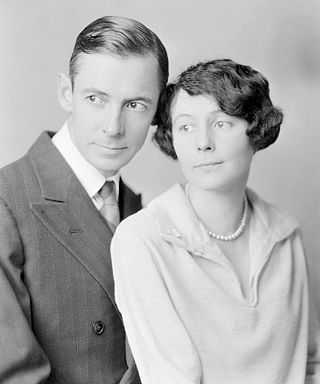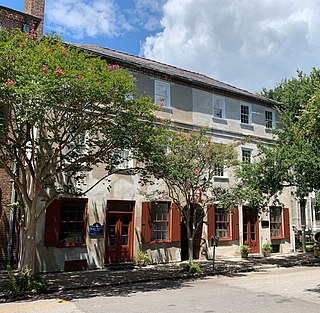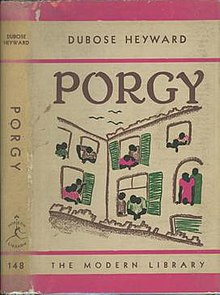
Porgy and Bess is an English-language opera by American composer George Gershwin, with a libretto written by author DuBose Heyward and lyricist Ira Gershwin. It was adapted from Dorothy Heyward and DuBose Heyward's play Porgy, itself an adaptation of DuBose Heyward's 1925 novel Porgy.

Thomas Heyward Jr. was an American Founding Father, lawyer, jurist, and politician. Heyward was active politically during the Revolutionary Era. As a member of the Continental Congress representing South Carolina, he signed the Declaration of Independence and Articles of Confederation. Heyward's imprisonment in Florida by the British for nearly a year and the loss of a considerable number of slaves led to his being proclaimed a martyr of the revolution.

Anne Brown was an American lyric soprano for whom George Gershwin rewrote the part of "Bess" into a leading role in the original production of his opera Porgy and Bess in 1935.

Edwin DuBose Heyward was an American author best known for his 1925 novel Porgy. He and his wife Dorothy, a playwright, adapted it as a 1927 play of the same name. The couple worked with composer George Gershwin to adapt the work as the 1935 opera Porgy and Bess. It was later adapted as a 1959 film of the same name.
"Summertime" is an aria composed in 1934 by George Gershwin for the 1935 opera Porgy and Bess. The lyrics are by DuBose Heyward, the author of the novel Porgy on which the opera was based, and Ira Gershwin.

Dorothy Heyward was an American playwright.

Porgy and Bess is a 1959 American musical drama film directed by Otto Preminger, and starring Sidney Poitier and Dorothy Dandridge in the titular roles. It is based on the 1935 opera Porgy and Bess by George Gershwin, DuBose Heyward and Ira Gershwin, in turn based on Heyward's 1925 novel Porgy, as well as Heyward's subsequent 1927 non-musical stage adaptation, co-written with his wife Dorothy. The film's screenplay, which turned the operatic recitatives into spoken dialogue, was very closely based on the opera and was written by N. Richard Nash. In 2011, the film was chosen for inclusion in the National Film Registry of the Library of Congress.
Mamba's Daughters (ISBN 1570030421) is a 1929 novel written by DuBose Heyward and published by the University of South Carolina Press. It was later adapted by Heward and his wife Dorothy Heyward for the stage; the play premiered on Broadway in 1939.
"My Man's Gone Now" is an aria composed by George Gershwin, with lyrics by DuBose Heyward, written for the opera Porgy and Bess (1935).

The Dubose Heyward House is a historic house at 76 Church Street in Charleston, South Carolina. Now a wing of a larger house, this modest two-story structure was the home from 1919 to 1924 of author Dubose Heyward (1885–1940), author of Porgy, one of the first works to portray Southern African-Americans in a positive light. The house was declared a National Historic Landmark in 1971.

Porgy and Bess is a 1976 album by pianist Oscar Peterson and guitarist Joe Pass featuring music from George Gershwin's opera Porgy and Bess. This is the only album on which Peterson plays the clavichord.

The Brass Ankles of South Carolina, also referred to as Croatan, lived in the swamp areas of Goose Creek, South Carolina and Holly Hill, South Carolina in order to escape the harshness of racism and the Indian Removal Act. African slaves and European indentured servants sought refuge amongst the Indians and collectively formed a successful community. Many of them are direct descendants of Robert Sweat and Margarate Cornish.
"Bess, You Is My Woman Now" is a duet with music by George Gershwin and lyrics by Ira Gershwin and DuBose Heyward. This song comes from the Gershwins' opera Porgy and Bess (1935) where it is sung by the main character Porgy and his beloved Bess. They express their love for each other and say that they now belong together.
As it has with every aspect of Charleston, South Carolina culture, the Gullah community has had a tremendous influence on Music in Charleston, especially when it comes to the early development of jazz music. In turn, the music of Charleston has had an influence on that of the rest of the country. The geechee dances that accompanied the music of the dock workers in Charleston followed a rhythm that inspired Eubie Blake's "Charleston Rag" and soon later James P. Johnson's "The Charleston", as well as the dance craze that defined a nation in the 1920s. "Ballin' the Jack", which was the popular dance in the years before "The Charleston", was written by native Charlestonian Chris Smith.

Porgy: A Play in Four Acts is a play by Dorothy Heyward and DuBose Heyward, adapted from the short novel by DuBose Heyward. It was first produced by the Theatre Guild and presented October 10, 1927 – August 1928 at the Guild Theatre in New York City. Featuring a cast of African Americans at the insistence of its authors—a decision unusual for its time—the original production starred Frank Wilson, Evelyn Ellis, Jack Carter, and Rose McClendon. Porgy marked the Broadway directing debut of Rouben Mamoulian. The play ran a total of 55 weeks in New York, and the original cast toured the United States twice and performed for 11 consecutive weeks in London.
"I Got Plenty o' Nuttin' " is a bass-baritone aria sung by the character Porgy from George Gershwin's 1935 "folk-opera" Porgy and Bess (1934). The lyrics are by DuBose Heyward, the author of the novel Porgy on which the opera was based, and Ira Gershwin. It is one of the most famous arias from the opera and it has been recorded by hundreds of singers and music groups.

Cabbage Row is a set of pre-Revolutionary buildings at 89 and 91 Church Street in Charleston, South Carolina. The buildings are most notable for having been the inspiration for "Catfish Row" in the DuBose Heyward novel Porgy and later the opera Porgy and Bess by Gershwin. DuBose Heyward had lived nearby on Church Street.
There have been many creative works set in Charleston, South Carolina. In addition, Charleston is a popular filming location for movies and television, both in its own right and as a stand-in for Southern and/or historic settings.
The literature of South Carolina, United States, includes fiction, poetry, and nonfiction. Representative authors include Dorothy Allison, Daniel Payne and William Gilmore Simms.










